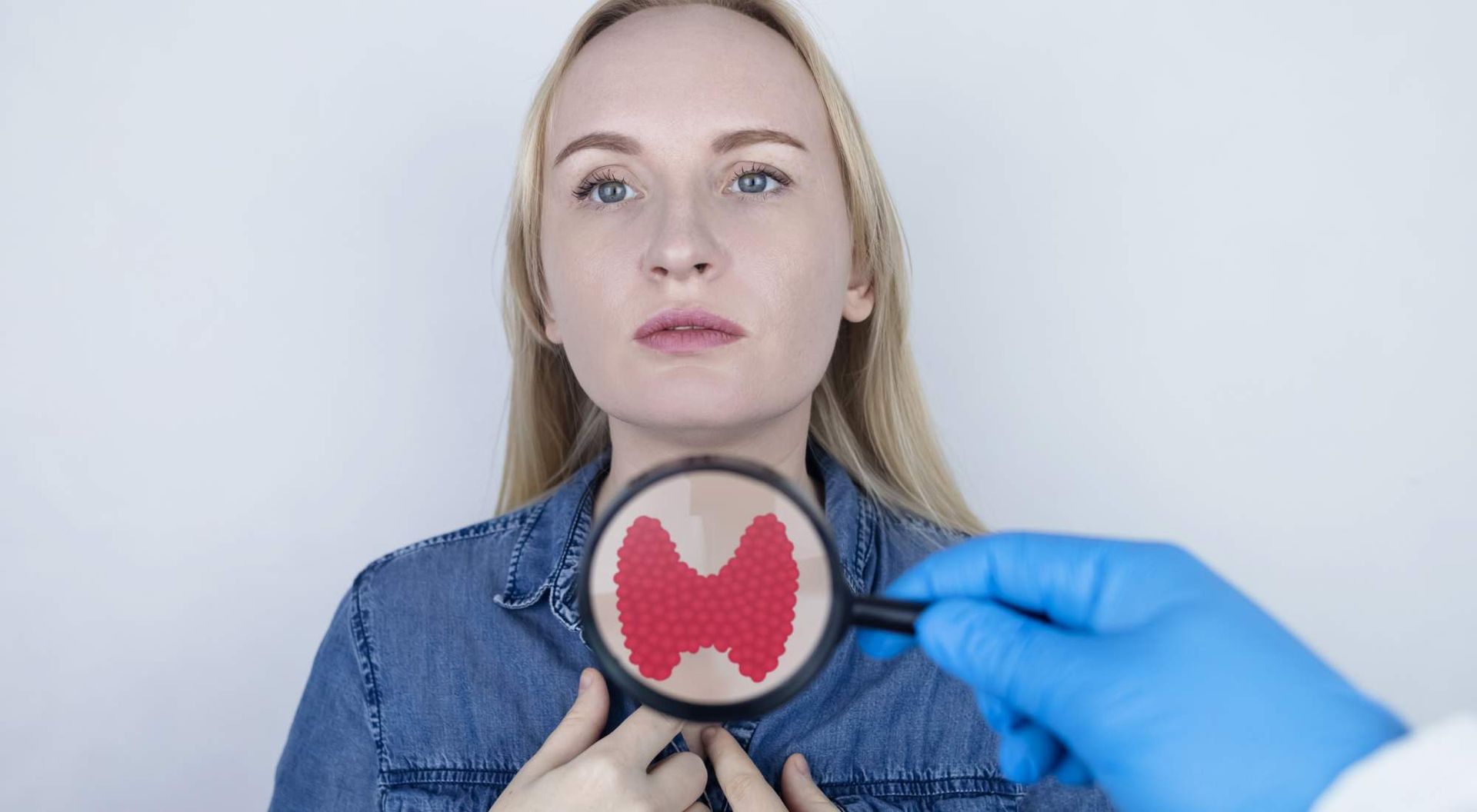Is Hypothyroidism an Autoimmune Disease? Understanding the Connection to Hashimoto’s
You’re walking out of your doctor’s office clutching a sheet of paper with your bloodwork results printed on it. It states that your thyroid hormone levels are all over the place.
Your doctor just informed you that you have Hashimoto’s hypothyroidism. Now you’re confused and full of questions.
What is hypothyroidism? How exactly is it connected to an autoimmune disease? What can you do to help relieve your symptoms?
Learn more about the connection between Hashimoto’s and hypothyroidism, six lifestyle changes you can make today to ease your symptoms, and more.
Table of Contents

What Is Hypothyroidism?
Hypothyroidism occurs when the thyroid gland in the neck doesn't produce enough of the thyroid hormone. The thyroid, a small, butterfly-shaped gland in the front of the neck, is in charge of how the body uses its energy and affects almost every part of the body. When the body doesn't make enough thyroid hormone, many of its necessary functions slow down.
A lack of thyroid hormone may present differently from person to person. Some of the most
common symptoms include:
- Fatigue
- Cold intolerance
- Weight gain
- Dry, thinning hair
- Joint and muscle pain
- Dry skin
- Slowed heart rate
- Heavy or irregular menstrual periods
- Infertility
- Depression
Doctors will initially use a series of blood tests to determine if an individual has hypothyroidism caused by an autoimmune disease. The first is commonly a TSH (thyroid-stimulating hormone) test to determine if your thyroid is producing enough hormones. They might also check your T4 (thyroxine) levels. Low T4 confirms a hypothyroidism diagnosis. If Hashimoto’s is suspected, tests to measure the free T3 and thyroid antibodies might be necessary. Additionally, a doctor might request an ultrasound if there’s a possibility of a goiter or nodules, but bloodwork is the standard route.
Is Hypothyroidism an Autoimmune Disorder?
The
primary cause of hypothyroidism in the United States is Hashimoto’s thyroiditis, an autoimmune disease that causes the
immune system to attack the thyroid gland. However, it’s not the only thing that can cause hypothyroidism.
Hypothyroidism can also be caused by
several other things not related to a disease or illness, including:
- Thyroid surgery or removal
- Radiation to the head and neck
- Certain medications
- Congenital defects
- An overactive or underactive pituitary gland
If you’re struggling with hypothyroidism and want to stay away from modern medical band-aids, schedule a free nutrition consultation today with HealitherU.
6 Nutritional and Lifestyle Tips To Support Hypothyroidism
Autoimmune-caused hypothyroidism can’t be explained by genetics alone, as was once previously thought. Research is finding evidence of environmental factors and lifestyle also playing a role in triggering an initial autoimmune attack on the thyroid in someone who’s genetically predisposed to hypothyroidism.
Here’s how you can make small lifestyle changes to support your hypothyroidism:
#1: Eat a Nutrient-Rich Diet
While everyone should eat a healthy, nutrient-rich diet, it’s especially
important if a person suffers from hypothyroidism. Not getting enough of the correct kinds of food may increase the severity of symptoms and make the immune system work harder than necessary. Think of it as giving the body the best possible structure to support the thyroid instead of weakening it.
Key Nutrients
There are several key micronutrients that an individual with hypothyroidism depends on to support the proper function of the gland, including:
- Iodine
- Selenium
- Iron
- Zinc
- Copper
- Magnesium
- Vitamin A
- Vitamin B12
Gut Health Support
New
studies suggest that the gut microbiome can significantly affect autoimmune diseases.
Intestinal bacteria play a vital role in immune regulation. The biome is influenced by diet and prebiotics, and is being
studied to find out how a change in diet can affect an autoimmune disease.
#2: Choose an Anti-Inflammatory Diet
Inflammation is the body’s
defense response system to injuries, illness, or harmful stimuli. When the response never turns off, it transitions into chronic inflammation and can cause
tissue and organ damage,
disrupt hormone balances, and increase the
risk of developing conditions such as other autoimmune diseases, heart disease, diabetes, and some cancers.
Foods To Avoid
Anything highly processed should be avoided because the artificial flavors, colors, and preservatives are known to trigger new autoimmune flare-ups or increase the intensity of ones already happening.
We suggest avoiding the following foods:
- Red meat
- Processed meat
- Commercial baked goods
- Bread and pasta made with white flour
- Deep-fried items
- Foods high in added sugar
- Sugar-sweetened beverages
- Trans fats
Foods To Include
Foods high in omega-3 fatty acids are important parts of the diet as the fatty acids they contain are important inflammation fighters. The body can gain the same benefits from a high-quality fish oil supplement.
Consider foods like:
- Salmon
- Herring
- Mackerel
- Sardines
- Tuna
- Anchovies
- Striped bass
- Nuts
- Seeds
Vitamin C, also called ascorbic acid, is a powerful antioxidant that can also help counter the effects of inflammation, such as damage to the cellular structure. You might also try foods rich in polyphenols, which are important naturally occurring protectors against inflammation damage.
Gut-healthy foods create a gut microbiome full of beneficial bacteria, which is important to shield your body against inflammation. To reap these benefits, consider foods like:
- Fermented foods
- Yogurt and cottage cheese
- Jerusalem artichokes
- Asparagus
- Bananas
- Chickory

Cooking Methods
Grilling meat, especially red meat, can cause fat drippings to fall into the flames, which may create cancer-causing compounds. However, grilling fish and vegetables is safe.
Microwaving food is also safe, since the food is heated and cooked by activating water molecules. This method is healthier than frying or grilling.
But remember, using processed sauces and dressings will negate the health effects of low-fat fish and vegetables chosen for meals. The best cooking methods to preserve the health benefits are:
- Baking
- Steaming
- Fast stir-frying
#3: Reduce Sugar Intake
Imbalanced blood sugar levels and inflammation are two of the biggest causes of hypothyroidism symptoms, so reducing sugar intake can be a beneficial lifestyle change. Eating sugar, particularly from processed foods, starts a vicious cycle of sugar crashes and then more intense sugar cravings. These foods are also full of artificial colors, preservatives, and flavors, which can negatively impact inflammation and gut health.
Stomach lining issues (like “leaky gut”) and a liver overloaded with chronic inflammation and poor diet can make thyroid function and symptom flare-ups worse. When the liver is overtaxed, it can’t convert T4 hormone into T3 hormone, which is the one the body uses as energy for organs and muscles.
#4: Manage Stress Levels
Uncontrolled cortisol (the stress hormone) levels can interfere with how thyroid hormones are made, converted, and used.
High cortisol — often linked to chronic stress — can prevent the conversion of T4 into T3, which can lead to weight gain, brain fog, and fatigue.
It can also encourage the development of the rT3 hormone (reverse T3), which blocks T3 receptors. This can make symptoms worse even if all test results come back in normal ranges.
Chronic high cortisol can also interrupt how the immune system regulates, which may make Hashimoto’s hypothyroidism symptoms worse.
Elevated levels can cause their own symptoms, like weight gain around the belly, insomnia, and anxiety, which can overlap or even intensify autoimmune symptoms.
Those with Hashimoto’s hypothyroidism are especially sensitive to stress, as elevated levels of stress can trigger flare-ups.
#5: Stay Physically Active
Scientists have
discovered that thyroid disorders may be associated with a variety of separate conditions that have all been thought to affect thyroid production, including:
- Cardiovascular
- Metabolic
- Neuromuscular
- Musculoskeletal
- Psychiatric disorders
Regular physical activity can assist in hypothyroidism management and overall health because it helps to manage many of the associated conditions.

#6: Maintain a Consistent Sleep Schedule
Creating and maintaining a proper sleep schedule is essential to everything the body does. Individuals with Hashimoto’s are particularly sensitive to sleep disruptions, as they can cause more intense flare-ups.
Without consistent and restful sleep at night, many body functions can’t work properly — including the production and regulation of hormones — which can weaken the immune system further, adding more stress to the already taxed thyroid.
Is Hypothyroidism an Autoimmune Disease? Frequently Asked Questions
What Autoimmune Disorders Are Associated With Hypothyroidism?
Hypothyroidism, particularly Hashimoto’s thyroiditis, has been shown to increase the risk of developing other autoimmune diseases, including
- Celiac disease
- Rheumatoid arthritis
- Addison’s disease
- Vitiligo
- Pernicious anemia
- Systemic lupus erythematosus
Those with thyroid disease caused by autoimmunity may also develop conditions like diabetes, multiple sclerosis, or premature menopause.
Can Hypothyroidism Cause Autoimmune Disorders?
No,
hypothyroidism does not cause autoimmune disorders. It is usually the outcome of an autoimmune condition, like Hashimoto’s, which is the most common cause of hypothyroidism. However, having one autoimmune condition could increase the risk of others developing.
How Do Autoimmune Thyroid Issues Affect Women?
Women are disproportionately affected by Hashimoto’s hypothyroidism, up to 10 times more likely to develop it than men. It usually affects women aged 30 to 50; however, it can occur in teens or young women. Hormonal changes like pregnancy and menopause can increase the risk of triggering flare-ups.
Balance Your Hormones Naturally With Personalized Nutrition Guidance by HealthierU
If you or a loved one is suffering from hypothyroidism, contact us at HealthierU to request a nutrition consultation today. At our holistic practice, we specialize in finding the underlying cause of women’s health issues. Once we discover the root of your problem, we’ll design a unique plan to help alleviate your symptoms.
Our team would love to answer your questions and help you on your path to nutritionally balanced hormones and fewer hypothyroidism flare-ups. Contact us today to learn more about how we can help.



